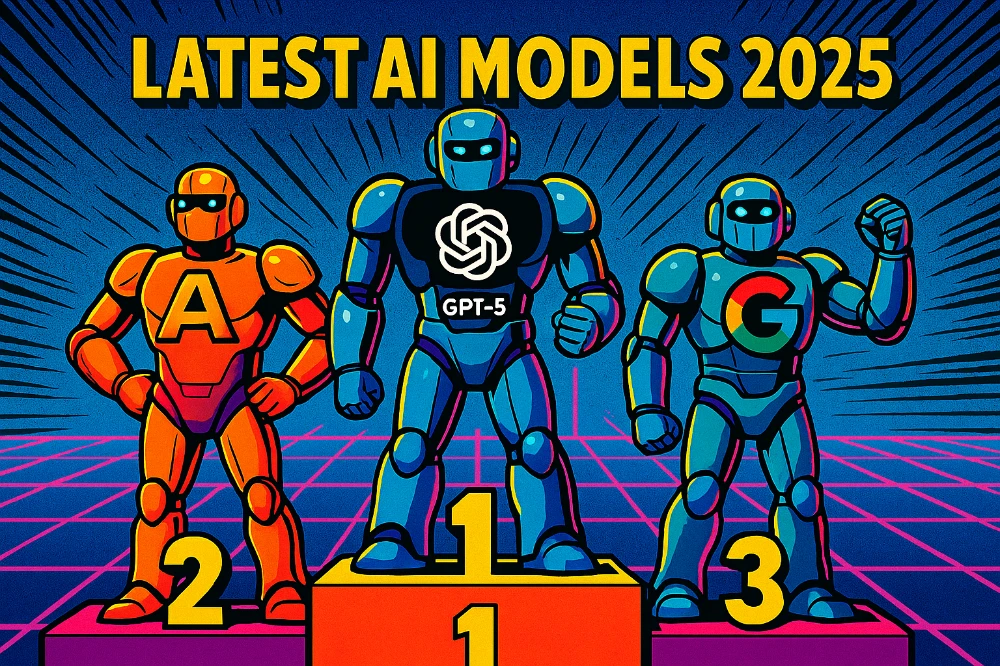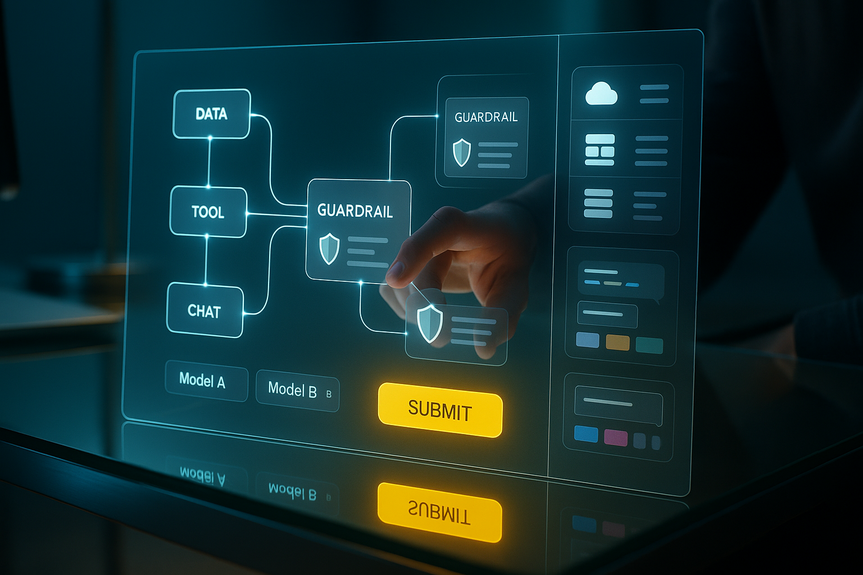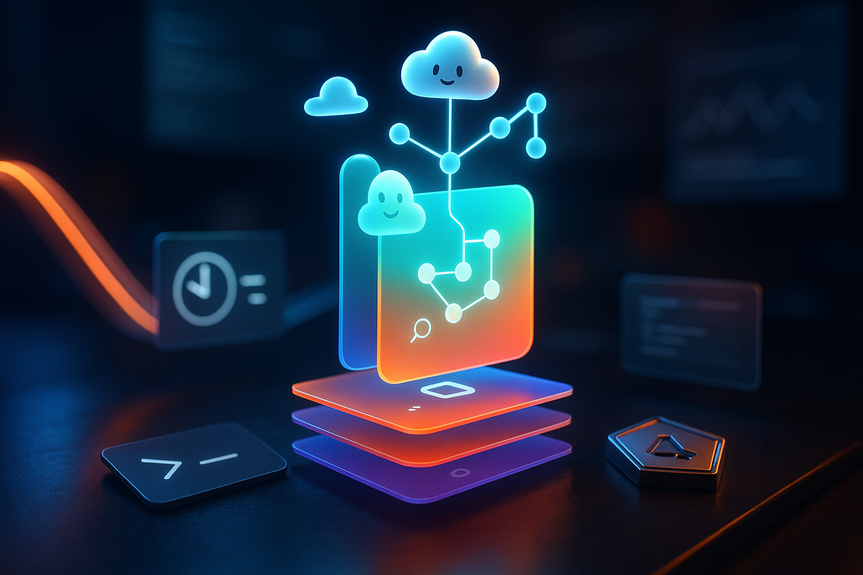
AI News
08 Aug 2025
Read 8 min
Latest AI Models 2025 – Your Guide After the GPT-5 Launch
Comparison of current AI models in 2025: GPT-5, Claude, and Gemini – which AI is right for you?
Artificial intelligence is moving fast. Almost every month, new features, updates, or even whole new models hit the market. But August 7, 2025 was special: OpenAI released GPT-5, shaking up the entire field of current AI models. In this guide, you’ll learn which AI models are leading right now, how they differ, and which one might be the best fit for you as a beginner or curious user.
1. Why Comparing AI Models Matters Right Now
If you’re starting with AI today, the choices can feel overwhelming. Alongside GPT-5, you’ll find Claude Opus 4.1 from Anthropic and Gemini 2.5 Pro from Google — each with its own strengths. For beginners, the key questions are:
- Which model fits my budget?
- Which one works best for my tasks?
- Is a budget model enough, or should I go premium?

2. GPT-5 – The New All-Round Standard
With GPT-5, OpenAI has made things simpler. Instead of switching between “fast” and “deep thinking” versions, GPT-5 uses a Unified System. It decides for you when a quick reply is enough or when deep reasoning is needed.
- 256,000 token context window — big enough for book drafts, large research projects, or massive code files.
- Speed + accuracy combined — thanks to smart routing.
- Lower cost: GPT-5 Standard is about $1.25 per million input tokens, much cheaper than most rivals.
- Different versions: GPT-5 Mini (budget-friendly for automations) and GPT-5 Nano (for smaller devices).
Why beginners love it: It’s versatile (writing, research, image understanding, coding), easy to use, and gives consistent, high-quality answers.

3. Claude Opus 4.1 – The Precision Specialist
Claude Opus 4.1 focuses on precision and code quality. It has a very low hallucination rate, is excellent at refactoring, and follows clear ethical guidelines (Constitutional AI). The drawback is price — about $15 per million input tokens — making it a niche choice unless top-level accuracy is your main goal.

4. Gemini 2.5 Pro – The Context King
Gemini 2.5 Pro has the largest context window on the market — up to 1 million tokens. It’s perfect for extremely long documents or huge datasets. Strengths include excellent Google Workspace integration and cost-effectiveness for massive text volumes. Weaknesses: behind GPT-5 and Claude in coding and deep reasoning, and some features aren’t widely available yet.
5. Real-World Use Cases – Which Model Fits Where?
5.1 Research & Fact-Finding
- GPT-5: Best with built-in tools and smart routing.
- Claude Opus 4.1: Good, but more manual setup.
- Gemini 2.5 Pro: Strong for very long sources.
Best pick: GPT-5.
5.2 SEO Keyword Research
- GPT-5: Fast, accurate, strong at keyword grouping.
- Claude Opus 4.1: Slightly more precise, but far pricier.
- Gemini 2.5 Pro: Cheap for huge datasets, less refined results.
Best pick: GPT-5.
5.3 Content & Blog Writing
- GPT-5: Natural style, adaptable tone.
- Claude Opus 4.1: Premium writing quality.
- Gemini 2.5 Pro: Average creativity.
Best pick: GPT-5 for most, Claude for high-end content.
5.4 Programming & Automation
- GPT-5: Top benchmark scores, great for complex projects.
- Claude Opus 4.1: Excellent code reviews.
- Gemini 2.5 Pro: Better for documentation than coding.
Best pick: GPT-5.
5.5 Low-Budget Automation
- GPT-5 Mini: $0.25/M tokens, unbeatable for cheap tasks.
- Gemini Flash: Fast, but pricier.
- Claude Haiku: Costs more, rarely worth it for simple jobs.
Best pick: GPT-5 Mini.
6. Price Overview 2025 – Quick Guide
| Model | Price / 1M input tokens | Context size | Strengths |
|---|---|---|---|
| GPT-5 Standard | $1.25 | 256k tokens | All-rounder, strong in almost everything |
| GPT-5 Mini | $0.25 | 128k tokens | Budget automation & tools |
| Claude Opus 4.1 | $15.00 | 200k tokens | Precision, code quality |
| Gemini 2.5 Pro | $0.30 | 1M tokens | Huge document handling, Google tie-in |
7. Conclusion – The New Ranking of AI Models
- GPT-5: Best for 80–90% of tasks.
- Claude Opus 4.1: Best for precision work.
- Gemini 2.5 Pro: Best for massive context needs.
Tip for beginners: Start with GPT-5 Standard or Mini.
FAQ – Common Questions About Current AI Models
1) What are “current AI models”?
The latest large language models (LLMs) like GPT-5, Claude Opus 4.1, and Gemini 2.5 Pro. They can write text, do research, code, and in some cases understand images.
2) Which AI model is best for beginners in 2025?
Usually GPT-5 — it’s powerful, easy to use, and affordable. For automation, GPT-5 Mini is ideal.
3) Is GPT-5 better than Claude or Gemini?
For most everyday work, yes. Claude Opus 4.1 is best for high-precision coding, and Gemini 2.5 Pro is great for very large documents or Google-focused workflows.
4) What is Claude Opus 4.1 best at?
High-precision answers, careful code improvement, and enterprise projects with strict safety needs.
5) When should I use Gemini 2.5 Pro?
When you need to process huge text volumes or work deeply inside Google Workspace.
6) How much do these models cost?
Approximate cost per million input tokens: GPT-5 Standard ~$1.25, GPT-5 Mini ~$0.25, Gemini ~$0.30, Claude Opus 4.1 ~$15.
7) Which AI is best for SEO & blog content?
GPT-5 for most cases, as it combines quality and low cost. Claude is better for premium, highly-polished content.
8) Which model helps most with programming?
GPT-5 for building and prototyping, Claude Opus 4.1 for detailed, accurate code reviews.
9) I’m on a tight budget — which should I choose?
GPT-5 Mini for automation and repeat tasks, GPT-5 Standard for a wider range of projects.
Sources
- AP News: https://www.apnews.com/article/d12cd2d6310a2515042067b5d3965aa1
- OpenAI – Introducing GPT-5: https://openai.com/index/introducing-gpt-5/
- Anthropic – Claude Opus 4.1: https://www.anthropic.com/news/claude-opus-4-1
- Google Blog – Gemini 2.5 Pro Update: https://blog.google/intl/de-de/unternehmen/technologie/gemini-unsere-intelligentesten-modelle-werden-noch-besser-io-2025/
Related Links
Contents






